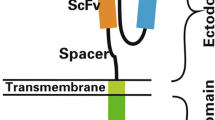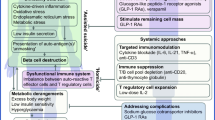Abstract
Introduction
Diabetogenic autoreactive T cells with effector/memory characteristics are described in type 1 diabetes patients (T1D). Alternatively activated dendritic cells (aaDCs) have been regarded as promising tools for clinical application in autoimmune diseases (ADs), although their ability to induce antigen-specific tolerance in T cells derived from ADs has yet to be determined.
Methods
Monocyte-derived dendritic cells (DCs) were produced utilizing GM-CSF and IL-4, and aaDCs by adding IL-10 and TGF-β (10/TGF-DC) during differentiation. Both cell groups were insulin-loaded, maturated with lipopolysaccharide, and cocultured with autologous effector/memory T cells derived from T1D individuals, in order to evaluate the induction of insulin-specific tolerance.
Results and Discussion
In five of eight T1D patients analyzed in vitro, 10/TGF-DC were able to induce insulin-specific tolerance in effector/memory CD4+ T cells (50.4% ± 13.2 less proliferation), without affecting the proliferative response to an unrelated antigen (candidin). Tolerance induction was dependent on the current activation state of CD4+ T cells in each patient. 10/TGF-DC-stimulated T cells acquired an IL-2lowIFN-γlowIL-10high cytokine profile, and their hyporesponsiveness could be reverted upon exposure to IL-2. This study shows a perspective about the in vitro ability of monocyte-derived 10/TGF-DC to induce antigen-specific tolerance in effector/memory T cells generated during the course of an autoimmune disease.





Similar content being viewed by others
Abbreviations
- ADs:
-
autoimmune diseases
- cTC:
-
control T lymphocytes
- iDCs:
-
immature DC
- LPS:
-
lipopolysaccharide
- mDCs:
-
mature DC
- MFI:
-
mean fluorescence intensity
- rTC:
-
T cells with no prior stimulation in vitro
- T1D:
-
type 1 diabetes
- tDCs:
-
tolerogenic DC
- 10/TGF-DC:
-
DC generated with IL-10/TGF-β1
- tTC:
-
tolerant T lymphocytes
References
Knip M, Slijander H. Autoimmune mechanisms in type 1 diabetes. Autoimmun Rev. 2008;7:550–7.
Concannon P, Rich SS, Nepom GT. Genetics of type 1A diabetes. N Engl J Med. 2009;360:1646–54.
Shoenfeld Y, Zandman-Goddard G, Stojanovich L, Cutolo M, Amital H, Levy Y, et al. The mosaic of autoimmunity: hormonal and environmental factors involved in autoimmune diseases. Isr Med Assoc J. 2008;10:8–12.
Wasserfall CH, Atkinson MA. Autoantibody markers for the diagnosis and prediction of type 1 diabetes. Autoimmun Rev. 2006;5:424–8.
Guzit V, Tasher D, Hanukuglu A, Landau Z, Ben-Yehuda Y, Somekh E, et al. Atopy in children and adolescents with insulin-dependent diabetes mellitus. Isr Med Assoc J. 2008;10:858–61.
Sharif S, Arreaza GA, Zucker P, Delovitch TL. Regulatory natural killer T cells protect against spontaneous and recurrent type 1 diabetes. Ann NY Acad Sci. 2002;958:77–88.
Di Lorenzo TP, Peakman M, Roep BO. Systematic analysis of T cell epitopes in autoimmune diabetes. Clin Exp Immunol. 2007;148:1–16.
Roep BO. The role of T-cells in the pathogenesis of Type 1 diabetes: from cause to cure. Diabetologia. 2003;46:305–21.
Roep BO. T-cell responses to autoantigens in IDDM. The search for the Holy Grail. Diabetes. 1996;45:1147–56.
Smerdon RA, Peakman M, Hussain MJ, Alviggi L, Watkins PJ, Leslie RD, et al. Increase in simultaneous coexpression of naive and memory lymphocyte markers at diagnosis of IDDM. Diabetes. 1993;42:127–33.
MarttilaJ HS, Vaarala O, Suzyki K, Elliott JF, Narvanen A, Knip M, et al. T-cell reactivity to insulin peptide A1-12 in children with recently diagnosed type t diabetes or multiple beta-cell autoantibodies. J Autoimmun. 2008;31:142–8.
Petersen LD, Duinkerken G, Bruining GJ, van Lier RA, de Vries RR, Roep BO. Increased numbers of in vivo activated T cells in patients with recent onset insulin-dependent diabetes mellitus. J Autoimmun. 1996;9:731–7.
Fairchild PJ, Austyn JM. Thymic dendritic cells: phenotype and function. Int Rev Immunol. 1990;6:187–96.
Scheinecker C. Constitutive presentation of a natural tissue autoantigen exclusively by dendritic cells in the draining lymph node. J Exp Med. 2002;196:1079–90.
Steinman R. Tolerogenic dendritic cells. Annu Rev Immunol. 2003;21:685–711.
Dhodapkar MV, Steinman RM, Krasovsky J, Munz C, Bhardwaj N. Antigen-specific7 inhibition of effector T cell function in humans after injection of immature dendritic cells. J Exp Med. 2001;193:233–8.
Mahnke K, Schmitt E, Bonifaz L, Enk AH, Jonuleit H. Immature, but not inactive: the tolerogenic function of immature dendritic cells. Immunol Cell Biol. 2002;80:477–83.
Menges M, Rossner S, Voigtländer C, Schindler H, Kukutsch NA, Bogdan C, et al. Repetitive injections of dendritic cells matured with tumor necrosis factor alpha induce antigen-specific protection of mice from autoimmunity. J Exp Med. 2002;195:15–21.
Rutella S, Danese S, Leone G. Tolerogenic dendritic cells: cytokine modulation comes of age. Blood. 2006;108:1435–40.
Torres-Aguilar H. Tolerogenic dendritic cells generated with different immunosuppressive cytokines induce antigen-specific anergy and regulatory properties in memory CD4+ T cells. J Immunol. 2010;184:1765–75.
Sato K, Yamashita N, Baba M, Matsuyama T. Modified myeloid dendritic cells act as regulatory dendritic cells to induce anergic and regulatory T cells. Blood. 2003;101:3581–9.
Wållberg M, Green EA. Are B cells a potential target for therapeutic intervention in the classical T cell-mediated autoimmune disease type 1 diabetes? Inflamm Allergy Drug Targets. 2009;8:130–8.
Ma L, Qian S, Liang X, Wang L, Woodward JE, Giannoukakis N, et al. Prevention of diabetes in NOD mice by administration of dendritic cells deficient in nuclear transcription factor-kappaB activity. Diabetes. 2003;52:1976–85.
Mukhopadhaya A, Hanafusa T, Jarchum I, Chen YG, Iwai Y, Serreze DV, et al. Selective delivery of beta cell antigen to dendritic cells in vivo leads to deletion and tolerance of autoreactive CD8+ T cells in NOD mice. Proc Natl Acad Sci USA. 2008;105:6374–9.
Xia CQ, Peng R, Qiu Y, Annamalai M, Gordon D, Clare-Salzler MJ. Transfusion of apoptotic beta-cells induces immune tolerance to beta-cell antigens and prevents type 1 diabetes in NOD mice. Diabetes. 2007;56:2116–23.
Krishnamurthy B, Dudek NL, McKenzie MD, Purcell AW, Brooks AG, Gellert S, et al. Responses against islet antigens in NOD mice are prevented by tolerance to proinsulin but not IGRP. J Clin Invest. 2006;116:3258–65.
Aspord C, Thivolet C. Nasal administration of CTB-insulin induces active tolerance against autoimmune diabetes in non-obese diabetic (NOD) mice. Clin Exp Immunol. 2002;130:204–11.
Markees TG, Serreze DV, Phillips NE, Sorli CH, Gordon EJ, Shultz LD, et al. NOD mice have a generalized defect in their response to transplantation tolerance induction. Diabetes. 1999;48:967–74.
Waldman TA, Dubois S, Tagaya Y. Contrasting roles of IL-2 and IL-15 in the life and death of lymphocytes: implications for immunotherapy. Immunity. 2001;14:105–10.
Lakkis FG, Sayegh MH. Memory T cells: a hurdle to immunologic tolerance. J Am Soc Nephrol. 2003;14:2402–10.
Jenkins M. Memory and anergy: challenges to traditional T lymphocyte differentiation. FASEB J. 1992;6:2428–33.
Anderson AE, Sayers BL, Haniffa MA, Swan DJ, Diboll J, Wang XN, et al. Differential regulation of naive and memory CD4+ T cells by alternatively activated dendritic cells. J Leukoc Biol. 2008;84:124–33.
Call ME, Wucherpfennig KW. The T cell receptor: critical role of the membrane environment in receptor assembly and function. Annu Rev Immunol. 2005;23:101–25.
Ford ML, Koehn BH, Wagener ME, Jiang W, Gangappa S, Pearson TC, et al. Antigen-specific precursor frequency impacts T cell proliferation, differentiation, and requirement for costimulation. J Exp Med. 2007;204:299–309.
Anderton SM, Wraith DC. Selection and fine-tuning of the autoimmune T-cell repertoire. Nat Rev Immunol. 2002;2:487–98.
Walker LS, Abbas AK. The enemy within: keeping self-reactive T cells at bay in the periphery. Nat Rev Immunol. 2002;2:11–9.
Mustelin T, Vang T, Bottini N. Protein tyrosine phosphatases and the immune response. Nat Rev Immunol. 2005;5:43–57.
Appleman LJ, Boussiotis VA. T cell anergy and costimulation. Immunol Rev. 2003;192:161–80.
Caux C, Massacrier C, Vanbervliet B, Dubois B, Van Kooten C, Durand I, et al. Activation of human dendritic cells through CD40 cross-linking. J Exp Med. 1994;180:1263–72.
Grohmann U, Bianchi R, Orabona C, Fallarino F, Vacca C, Micheletti A, et al. Functional plasticity of dendritic cell subsets as mediated by CD40 versus B7 activation. J Immunol. 2003;171:2581–7.
Cai Y, Yang YR, Xia P, Zheng SL. Blockade of CD154-CD40 pathway induces interleukin-10 dependent T regulatory type 1 like cells. Chin Med J (Engl). 2006;119:518–22.
Nanji SA, Hancock WW, Luo B, Schur CD, Pawlick RL, Zhu LF, et al. Costimulation blockade of both inducible costimulator and CD40 ligand induces dominant tolerance to islet allografts and prevents spontaneous autoimmune diabetes in the NOD mouse. Diabetes. 2006;55:27–33.
Taylor PA, Friedman TM, Korngold R, Noelle RJ, Blazar BR. Tolerance induction of alloreactive T cells via ex vivo blockade of the CD40:CD40L costimulatory pathway results in the generation of a potent immune regulatory cell. Blood. 2002;99:4601–9.
Casamayor-Palleja M, Khan M, MacLennan IC. A subset of CD4+ memory T cells contains preformed CD40 ligand that is rapidly but transiently expressed on their surface after activation through the T cell receptor complex. J Exp Med. 1995;181:1293–301.
Koschella M, Voehringer D, Pircher H. CD40 ligation in vivo induces bystander proliferation of memory phenotype CD8 T cells. J Immunol. 2004;172:4804–11.
Feili-Hariri M, Falkner DH, Morel PA. Regulatory Th2 response induced following adoptive transfer of dendritic cells in prediabetic NOD mice. Eur J Immunol. 2002;32:2021–30.
Li Y, Chu N, Rostami A, Zhang GX. Dendritic cells transduced with SOCS-3 exhibit a tolerogenic/DC2 phenotype that directs type 2 Th cell differentiation in vitro and in vivo. J Immunol. 2006;177:1679–88.
Yamaguchi Y, Tsumura H, Miwa M, Inaba K. Contrasting effects of TGF-beta 1 and TNF-alpha on the development of dendritic cells from progenitors in mouse bone marrow. Stem Cells. 1997;15:144–53.
Acknowledgements
The authors would like to thank to Prof. Eitan Israeli, Dr. Gisele Goddard, and Jana Petrikova, M.D., for valuable discussions and technical assistance. HTA has a postdoctoral fellowship of ICyTDF (BI09-532). This work was supported in part by Federico Foundation.
Author information
Authors and Affiliations
Corresponding author
Rights and permissions
About this article
Cite this article
Torres-Aguilar, H., Sánchez-Torres, C., Jara, L.J. et al. IL-10/TGF-β-Treated Dendritic Cells, Pulsed with Insulin, Specifically Reduce the Response to Insulin of CD4+ Effector/Memory T Cells from Type 1 Diabetic Individuals. J Clin Immunol 30, 659–668 (2010). https://doi.org/10.1007/s10875-010-9430-5
Received:
Accepted:
Published:
Issue Date:
DOI: https://doi.org/10.1007/s10875-010-9430-5




